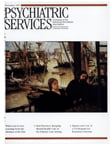Quality of life and clinical predictors of rehospitalization of persons with severe mental illness
Abstract
OBJECTIVE: The study examined whether rehospitalization of patients with severe and persistent mental illness could be predicted by patients' quality of life. The predictive ability of two clinical factors associated with rehospitalization--history of hospitalizations and severity of symptoms--was also examined. METHODS: A total of 559 patients were assessed at two follow-up points, two and 12 months after an index hospital discharge. Patients who were rehospitalized and those who were not rehospitalized between the two follow-up points were compared on subjective and objective quality of life, symptom severity at first follow-up, and previous rehospitalization. Multivariate analysis was used to determine the best predictors of rehospitalization. RESULTS: Compared with patients who were not rehospitalized, those who were rehospitalized had more severe symptoms and were more likely to have a history of hospitalization. Rehospitalized patients reported more dissatisfaction with family relations and were more likely to report an arrest in the past two months. The two groups did not differ in other quality-of-life domains and in global quality of life. CONCLUSIONS: The best predictors of rehospitalization were previous rehospitalization, more severe symptoms, and dissatisfaction with family relations. Interventions should promote positive relationships between patients with severe mental illness and their families to reduce the risk of relapse and rehospitalization.
Access content
To read the fulltext, please use one of the options below to sign in or purchase access.- Personal login
- Institutional Login
- Sign in via OpenAthens
- Register for access
-
Please login/register if you wish to pair your device and check access availability.
Not a subscriber?
PsychiatryOnline subscription options offer access to the DSM-5 library, books, journals, CME, and patient resources. This all-in-one virtual library provides psychiatrists and mental health professionals with key resources for diagnosis, treatment, research, and professional development.
Need more help? PsychiatryOnline Customer Service may be reached by emailing [email protected] or by calling 800-368-5777 (in the U.S.) or 703-907-7322 (outside the U.S.).



